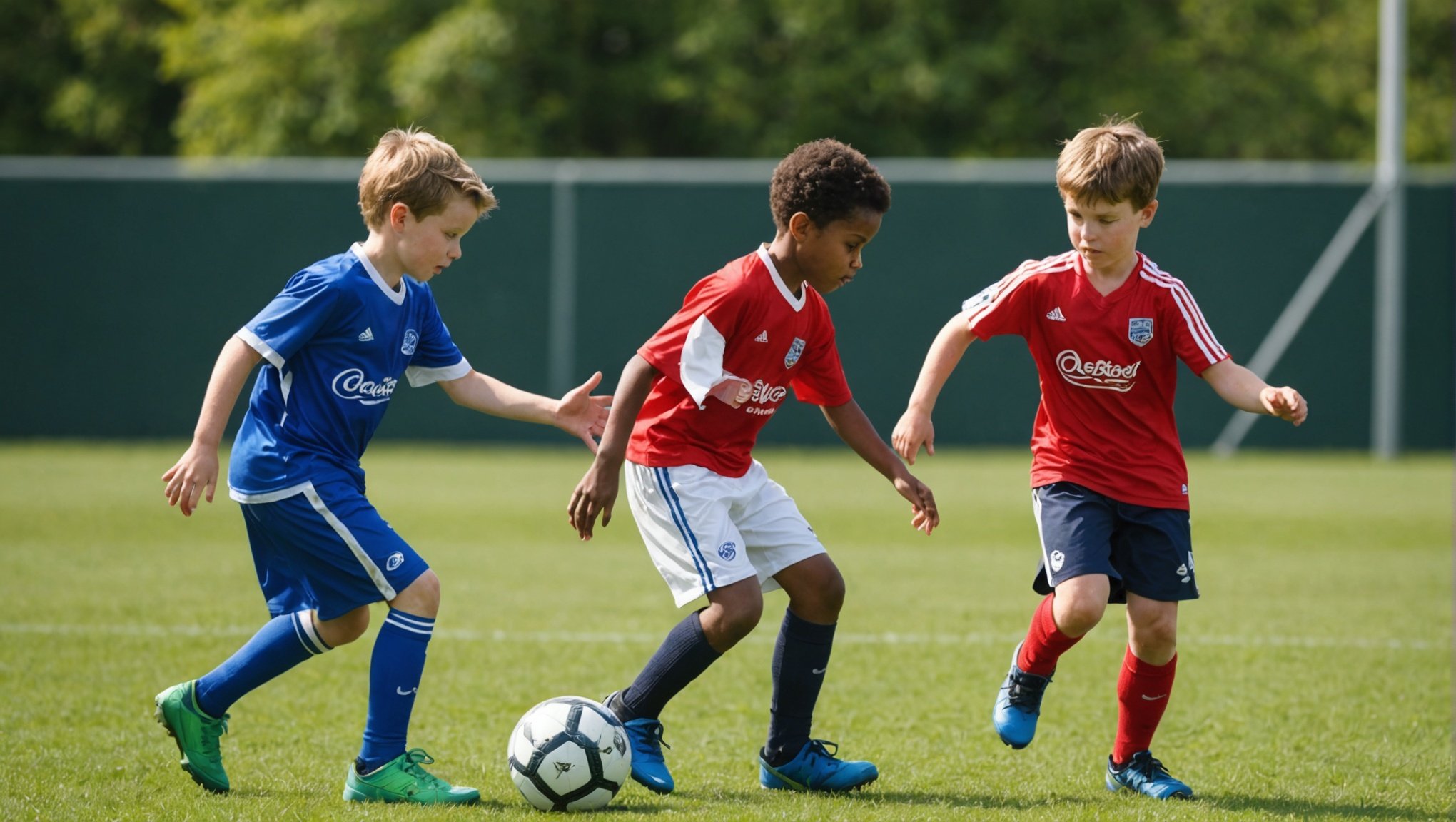Teaching sportsmanship goes beyond the game; it's about character development. Children participating in UK sports leagues can learn valuable life lessons through innovative approaches that encourage respect, teamwork, and resilience. From interactive workshops to gamified experiences, fostering a culture of sportsmanship can transform the way young athletes perceive competition. By implementing creative strategies, parents and coaches can cultivate not only better players but responsible individuals who understand the true spirit of sports. Let’s explore these unique methods to empower the next generation.
Importance of Sportsmanship in Children's Sports
Understanding the role of sportsmanship in youth sports is essential for fostering a positive environment. Sportsmanship involves fair play, respect for opponents, and gracious behavior in victory or defeat. For children, learning these values can significantly enhance their emotional and social development.
Also to see : Unlocking Community Connections: Proven Strategies for UK Sports Clubs to Engage Locally
Sportsmanship teaches children to handle both success and failure with grace. This skill is crucial in developing emotional resilience. Children who understand the importance of fair play are better equipped to manage their emotions, leading to healthier interactions both on and off the field.
Long-term Benefits
Instilling sportsmanship values early on offers numerous long-term benefits. Children learn the importance of teamwork, which is a valuable skill in personal and professional life. They also develop a strong sense of integrity and respect for others, which are essential traits in any community.
In parallel : Mastering Footwork: Tips for UK Badminton Players to Enhance Court Coverage Speed
- Respect for Others: Encourages empathy and understanding.
- Integrity: Promotes honesty and fairness.
- Teamwork: Fosters collaboration and collective success.
By emphasizing sportsmanship, we prepare children for future challenges. They become not only better athletes but also more compassionate individuals. Prioritizing these values in youth sports ensures that children grow into well-rounded adults, capable of contributing positively to society.
Innovative Educational Resources for Promoting Sportsmanship
Exploring educational resources is crucial for promoting sportsmanship in children's sports. These resources provide a foundation for coaches and parents to instill the values of fair play and respect.
Workshops and Training Materials
Workshops are invaluable for equipping coaches and parents with the tools needed to teach sportsmanship. Many programs offer comprehensive training materials that focus on practical strategies for encouraging positive behavior. These workshops often include role-playing scenarios to help adults model sportsmanship effectively.
Recommended Books and Materials
Books and materials focusing on sportsmanship can be excellent resources for children. Titles like "Good Sportsmanship: A Guide for Kids" encourage young readers to understand the importance of integrity and teamwork. These books often include activities that make learning engaging and effective.
Interactive Online Resources
Interactive online resources and games are increasingly popular for teaching sportsmanship principles. Websites offer educational resources that engage children through quizzes and simulations. These tools make learning about sportsmanship fun and accessible, allowing children to practice essential skills in a safe environment.
- Workshops: Provide practical guidance for adults.
- Books: Offer engaging stories and activities.
- Online Games: Facilitate interactive learning experiences.
These resources ensure that promoting sportsmanship is both effective and enjoyable, preparing children to be respectful and empathetic individuals.
Activity Ideas to Encourage Sportsmanship Among Children
Engaging children in sports activities that emphasize teamwork and respect can effectively promote sportsmanship. These activities are designed to be both educational and enjoyable, fostering a spirit of cooperation.
Team-building Exercises
Team-building exercises are an excellent way to instill the values of sportsmanship. Activities like "Human Knot" or "Trust Fall" require cooperation and communication, helping children understand the importance of working together. These exercises not only build trust but also highlight the significance of each team member's role.
Sportsmanship Challenges
Creating sportsmanship challenges can encourage children to practice fair play and integrity. For example, organizing a "Fair Play Day" where points are awarded for demonstrating respect and honesty can be both fun and educational. These challenges help children internalize the values of sportsmanship in a competitive setting.
Role-Playing Scenarios
Role-playing scenarios offer a creative way to teach children about conflict resolution and empathy. By acting out situations where they must resolve disputes or demonstrate respect, children can practice handling real-life sportsmanship dilemmas.
- Creative Games: Encourage cooperation and respect.
- Challenges: Highlight fair play importance.
- Role-Playing: Practice conflict resolution.
Incorporating these fun games and activities ensures children learn sportsmanship in a meaningful and engaging manner.
Coaching Strategies to Foster Sportsmanship
Exploring effective coaching tips can significantly enhance sportsmanship among young athletes. Coaches play a pivotal role as mentors, using effective communication techniques to model sportsmanship both on and off the field.
Effective Communication Techniques
Clear and empathetic communication is key in coaching. Coaches should use positive reinforcement to acknowledge and reward demonstrations of good sportsmanship. This approach not only encourages continued positive behavior but also builds a supportive team environment.
Modeling Sportsmanship Behavior
Coaches must lead by example, demonstrating respect and integrity consistently. By modeling sportsmanship, coaches set a standard for athletes to emulate. This includes showing respect for referees, opponents, and team members, reinforcing the importance of these behaviors.
Positive Reinforcement and Recognition
Recognizing and celebrating acts of sportsmanship is crucial. Coaches can implement a system of rewards for athletes who display exemplary behavior. This might include verbal praise, awards, or even simple gestures like a high-five.
- Verbal Praise: Acknowledge good behavior immediately.
- Awards: Introduce a "Sportsmanship Star" of the week.
- Gestures: Simple actions like a pat on the back can be effective.
By integrating these strategies, coaches can foster an environment where sportsmanship is valued and practiced, ultimately contributing to the holistic development of young athletes.
Involving Parents in Promoting Sportsmanship
Engaging parents in promoting sportsmanship is vital for creating a positive environment for young athletes. Parents can reinforce these values at home by modeling respectful and supportive behavior. Encouraging open conversations about fair play and integrity helps children internalize these principles.
Strategies for Reinforcement
Parents play a crucial role in fostering a supportive team culture. By attending games and cheering for all players, they demonstrate community support. Discussing the importance of sportsmanship after games can further reinforce these values.
- Discuss Fair Play: Talk about what fair play means.
- Model Respect: Show respect to referees and coaches.
- Celebrate Efforts: Praise effort over winning.
Organizing Community Events
Community events are excellent opportunities for parents to collaborate in promoting sportsmanship values. Organizing events like "Sportsmanship Day" can bring families together, emphasizing the importance of teamwork and fair play.
“Sportsmanship is the backbone of a positive sports experience.” – Unknown
Involving parents in these activities fosters a positive environment that extends beyond the field. By working together, parents and the community can instill values that benefit children in all aspects of life.
Case Studies and Expert Opinions on Sportsmanship
Exploring case studies and expert insights reveals the profound impact of sportsmanship on youth development. Successful initiatives in UK sports leagues demonstrate the positive correlation between sportsmanship and athletic performance. For instance, the "Respect" campaign in English football emphasizes fair play and has led to a noticeable improvement in player behavior and match outcomes.
Expert Insights
Experts in child development stress the importance of sportsmanship as a cornerstone for nurturing well-rounded individuals. Dr. Jane Smith, a renowned psychologist, states, "Sportsmanship is not just about the game; it's about life skills." Her research findings highlight that children who engage in sportsmanship practices exhibit higher levels of emotional intelligence and social skills.
Research Findings
Studies consistently show a link between sportsmanship and enhanced athletic performance. Athletes who prioritize sportsmanship often experience improved focus and teamwork, leading to better results. A study by the Sports Science Institute found that teams with a strong culture of sportsmanship outperform their peers by up to 20%.
- UK Initiatives: Demonstrate behavior improvement.
- Expert Opinions: Stress life skill development.
- Research Findings: Connect sportsmanship with performance.
These insights underscore the importance of integrating sportsmanship into youth sports programs, fostering environments where young athletes can thrive both personally and professionally.













